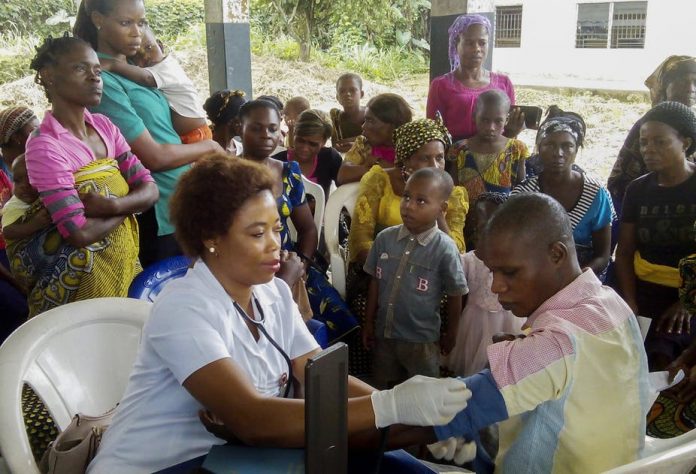|
Getting your Trinity Audio player ready...
|
Climate change has been labelled as the greatest public health risk of the 21st century. Health risks from climate change are expected to become increasingly severe in the coming years. They threaten the many advances being made in global public health.
Several health risks are anticipated from climate change. These include increases of vector-borne and diarrhoeal diseases. There are also changes in the geographic range of infectious diseases. This means a spread into new regions, the emergence of new infectious diseases and reemergence of old ones. An increase in the intensity of infectious diseases in already endemic regions is also expected.
Although climate change is a global threat, the potential risks are relatively higher in developing economies. These countries have overburdened and weak health systems, coupled with persistently poor health infrastructure.
It’s anticipated that some of the worst effects of climate change will be felt in sub-Saharan Africa. For example, climatic change has been reported as a driving force for the malaria highland invasion in the East African highlands.
It is crucial that countries’ public health systems are able to cope with climate sensitive diseases. The World Health Organisation (WHO) has acknowledged this and has outlined a range of mitigating measures. It identifies rebuilding public health capacity among the most important, cost-effective and urgent responses to climate change. This includes training in climate change and health to strengthen the technical and professional capacity of health personnel. Effective surveillance and emergency response systems also need to be put in place, coupled with sustainable prevention and control programmes.
In addition, countries need to design national health adaptation strategies, implement programmes to mitigate the health effects of climate change, and strengthen institutional capacities to address the health effects of climate change.
I set out to study whether Ghana’s health system and health workers are prepared for the potential health risks linked to climate change. These risks include possible outbreaks of communicable diseases like meningococcal meningitis and cholera.
The research
The research focused on two districts located in different ecological zones. The areas, located in the southern and northern zones, were chosen to account for different perspectives. The focus of the research was on the capacity and preparedness towards climate related health emergencies as it relates to climate sensitive infectious diseases.
Capacity and preparedness were assessed in two ways. First, I looked at whether programmes had been strengthened for professional health personnel to equip them to address potential climate related health risks. This could include human resource skill building and education. I also assessed the ability of health services to respond to potential emergencies from climate sensitive infectious diseases, emergency preparedness and management.
In-depth interviews and surveys were carried out among health professionals within public health facilities located in the two districts. Potential climate change health emergency risks that relate to climate sensitive infectious diseases within the Ghanaian context were assessed in both districts. The questions related only to known health risks and diseases.
The study showed that there were no capacity strengthening programmes for health workers to equip them to address potential climate related health risks. Over 80% of respondents from both study districts reported not receiving training or workshops targeted towards climate change and health. As a result, 65% of respondents in each district reported not having enough information to respond to climate related public health threats.
Respondents gave contrasting views on the issue of emergency preparedness and management. Some said they were prepared to address potential climate health risks and emergencies. Others said they weren’t. Respondents who indicated unpreparedness bemoaned the challenges they faced in delivering even basic health services. They concluded that they were not ready to deal with the impact of climate change on local populations’ health.
On the other hand, some respondents specified having the needed support, the necessary human resources and strategies in place to help address the health threats from climate change.
The study also showed that the position of a health facility on the hierarchical structure affected its capacity and preparedness levels. Health workers interviewed within the higher level of health delivery (district hospitals) acknowledged some level of preparedness to deal with climate health emergencies compared to those at the lower level (health centres).
Both levels nevertheless declared they might have challenges in addressing climate change health emergencies.
Overall, the study findings indicate that health systems capacity and preparedness levels towards climate change health risks didn’t differ across the study contexts.
Way forward
Our study also shed light on the urgent need for reforms to combat the looming health impact of climate change. The findings call for vital measures to be put in place in terms of health systems adaptation planning and resilience building.
It became apparent that knowledge, skill building, provision of logistics and infrastructure urgently need attention.
There is also a need to provide more resources, especially at the local levels. In addition, health professionals require in-service training programmes on climate change and health needs. Training and education are key to improving preparedness and capacity.
Lucia Hussey, PHD Candidate, Department of Geography & Collaborative Program in Global Health Systems in Africa, Western University
This article is republished from The Conversation under a Creative Commons license. Read the original article.





